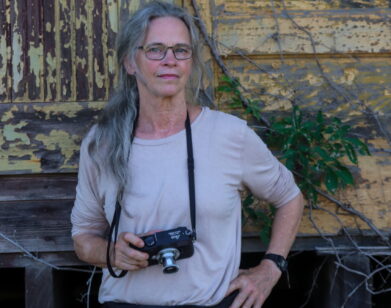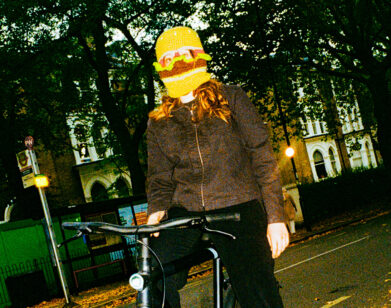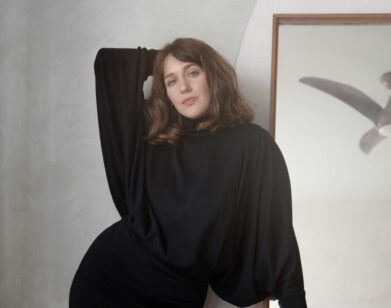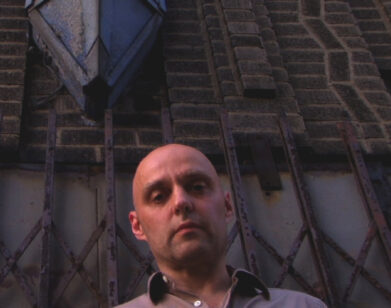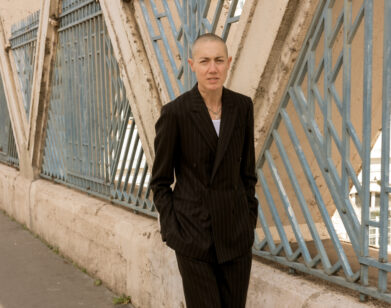LIT
Blake Butler on Faith, Therapy, and His Wrenching New Memoir Molly
I read Blake Butler’s memoir Molly in a 24-hour period leading up to this interview. I read it sitting on the floor as my son first drew and then built a marble run; I read it in bed while my husband slept and my dog snored; I read it at red lights, in line at Starbucks, and beneath a dome of hot air as foils warmed around my hair. And as I read, I felt like I was doing something profound and illicit, inhaling sentences this blood-boilingly, devastatingly beautiful while oat milk steamed.
I met Butler when he accepted a poem of mine for Lamination Colony, a journal he ran from 2003 to 2010. He went on to found HTMLGIANT, which featured writers like Roxane Gay and Melissa Broder and a bunch of alt lit guys, and has worked prolifically since Ever, his first book of fiction, came out in 2009. Eight books followed from increasingly visible presses, including Alice Knott and 300,000,000 . But I’d never been so totally consumed by Butler’s work—actually, I’m not sure I’ve ever been so totally consumed by any book—the way I was by Molly, the story of his marriage to poet Molly Brodak and the shocking revelations about her–and their–life Butler discovers after her suicide.
When I spoke with Butler earlier this month, I was unaware of the tabloids’ appropriation of the infidelity narrative and the resulting social media shitshow. The last time I’d been on social media was 2017, when I was liking Molly Brodak’s pastry photos (I remember some kind of sugar-work swan). I’d internet-known Molly: my literary magazine Tammy published her, and her literary magazine Aesthetix published me. A few days after Molly was published, Butler and I talked about Molly, rage, and how writing the book changed him.
———
JOANNA NOVAK: Hi, Blake. Where are you Zooming from today?
BLAKE BUTLER: I’m in my office in Baltimore.
NOVAK: Were you in New York for readings all week?
BUTLER: Yeah, we went up for the launch and I was supposed to do a talk at Columbia, but it was canceled ‘because of the protests.
NOVAK: A relief in a way, or a disappointment, or a little of both?
BUTLER: It was a panel about A.I and writing, which I have a lot of thoughts about. But I need to just exist.
NOVAK: We’ll save that until we talk a little bit about the book. I had read bits of it, like the Paris Review excerpt. I have had the experience over the last few years of being glued to my phone reading pieces about Molly and pieces of Molly. One of the images that recurs throughout this book is the idea of a void or a black hole, and I feel like the writing—this is the highest compliment—kind of sucks me into a black hole. Did the writing have that black hole quality in the composing process, or was it more gradual and meted out?
BUTLER: A black hole is a good metaphor because her death felt like I was at the pit of the black hole and from that point forward it was about getting out of it so I don’t die too. At first I was just like, “I have to get out.” But then as I was coming out, I felt that I needed to get this information to other people because they might be in a black hole. On a procedural level, coming to the desk every day felt like ripping the top of your head off. Unlike fiction, which I feel very removed from, this was like trying to describe the void while the void is trying to suppress you.
NOVAK: And there’s so much imagery throughout the book that speaks to that fight. There’s this real sense of being smothered, suppressed, and mortally wounded throughout. I was thinking about painting because it’s so imagistic. I was tracking light a lot, which is maybe the most visual thing. It’s not like I knew Molly as more than a vague internet friend, but it struck me just how barraged with trauma the narrator seemed.
BUTLER: I mean, I met Molly from the internet too. I met her on Facebook. Molly lived in the space of grief and trauma from as early as she could remember. She describes her childhood as feeling like a creature trapped in a situation she couldn’t get out of, referring to her parents and the chaos of their home life. So as a young girl, she’s just looking for ways to not bring more trauma by exposing herself even further. She described that as getting small. “I’m going to stay out of my family’s way because when I ask for anything, I get more grief.” That teaches you to shut the fuck up, and when you’re trying to start relationships or have rapport as an artist in the public view, you’re not going to come out with your nose open. Molly and I both spent a lot of time at home being anti-social, and a lot of our rapport with the world came from light through a window or light through the computer. Trying to describe such a complicated, multi-decade experience requires being open to following loose ends, to following light.
NOVAK: I really want to talk about paragraphs, because the book is all paragraphs. It makes your writing syrupy and dense in a way that keeps my brain working. When did you decide to commit to that syntax?
BUTLER: It’s entirely written as block paragraphs with section breaks, except for the second-to-last section, which is a letter to her that lets out some of that energy. I like that you described my fiction as syrupy, because this feels like syrup that’s been hardened into an amber object or something. I’m just a paragraph thinker. I like the way they build networks on pages, but in this case, I was also very angry. I’m writing this from rage at the world, at Molly’s choice, at things between us that I didn’t understand. So I started thinking of the paragraphs as bullets, and this book is an automatic weapon, shooting bullets into the reader to tell you something. It’s meant to be a big thing you have to swallow, I guess.
NOVAK: It reminds me of the Scarface bathtub cake that Molly makes. And then, of course, the ending of Scarface, which I just recently watched. When the narrator realizes that Molly had been having all these affairs, the rage and revenge becomes more present in the prose. When rage is allowed to take the stage, I felt happy in a weird, fucked up way, but also concerned.
BUTLER: I think I’ve always been motivated by rage. People that haven’t read the book have called this revenge porn, and I don’t want revenge on Molly. I want justice for Molly to the extent it can be had for a dead person. We were both enraged. It’s funny you mentioned Scarface because we watched it all the time. That and The Shining, which is another movie full of rage. Molly really liked the Tony Montana character. She taught a class about heroes at Kennesaw and she liked to share Tony Montana as the example of a hero driven by rage, one whose rage destroys him. At the end of that movie is one of the most violent scenes in film, and I’ve been thinking about that scene during this time of getting attacked on social media. He’s standing up there on the stairwell saying, “I’ll take your bullets.” She also really liked that scene where they’re at dinner and he gets into an argument with his wife and everyone’s staring at him and he’s like, “Take a look at me, you’re never going to see a bad guy that looks like this again.” I think Molly saw hope in that because her dad was a bank robber and she wrote a book trying to figure him out. Her point was that all people are good and bad. I know that she really despised herself because of the “bad” things she did, which made her turn her rage on herself. The point is to stay alive, to learn and to grow and to make something better of it, if you can. Molly couldn’t’, because she had too big a weight around her neck and she refused to believe the people that wanted to give her help. Maybe she thought that sometimes, but I think her baseline was ultimately, “everyone’s going to turn their back on me eventually.”
NOVAK: I am really interested in the structure of the book, because the reader knows from page seven or so that Molly commits suicide.I’m also interested in the decision to not include dates in what I view as the second movement of the book, which is the history of the relationship.
BUTLER: Yeah, at first I started writing all the memories in a roughly chronological order. For instance, the suicide that’s at the beginning was in the middle, where it belongs. I wrote about my mom dying and I wrote about Molly’s grandpa dying and then I realized I had forgotten the order. I was telling the story wrong. It felt like walking around this mansion full of rooms. A mansion doesn’t have a chronology, but they’re tied together and they’re related. So I started thinking, “This trip to Las Vegas where we had this transcendental experience, that belongs closer to this other transcendental thing.” The adultery doesn’t come up until late because I didn’t discover it until too late, so that’s how I lived it. I really didn’t know, and I didn’t want to tell anyone once I did. It would be hard to understand why she did what she did if you didn’t know she built this world where she was deceiving people. It’s not because I want vengeance on her, it’s because you can’t understand her without knowing the world she built for herself. It’s like sculpting and painting, but I am trying to get to the emotional core and keep the reader with me. Because it’s not Molly’s story, it’s mine.
NOVAK: The book is about faith in a lot of ways—faith in a parent, faith in family, faith in chosen family, faith in art and work and the self, faith in a higher power. Has writing about it changed your relationship to faith?
BUTLER: I really like that question. Molly and I came together in a mutual hell world of sorts. Molly was raised in neglect with no real adult guiding her. Where does faith come from if no one teaches you what to have faith in? Not to say Molly’s childhood was completely barren, but a child who can’t trust the person giving her food learns to doubt. The world told Molly that if there’s something to have faith in, like god, it doesn’t seem to take care of me. The first time I messaged her, she mentioned, “I’ve read Scorch Atlas and I love those stories.” That’s a really dark book that I wrote. As we got to know each other more, she was like, “You have a dark worldview, but you still have hope, don’t you?” And I was like, “Yeah, I do. I write darkness so that it has reckoning.”
NOVAK: This may be a real non-sequitur, but you’ve mentioned that you were being attacked on social media. Is that happening right now?
BUTLER: Yeah, it began with two people that know me, one person who was a close friend and another person who I’ve known of for a long time but I’ve never met. The first review of this book in the L.A. Times made me feel like I’m not insane for writing it. I asked as many women as I could who I trusted, and men too. People aren’t reacting to the book. They’re reacting to tabloid media that took that review. This bullshit attention that I hate and I find morally repugnant and exploitative, it hurts me in a real way. I’m getting on Twitter and I’m responding because I’ve spent a lot of time in trolly iron-on-iron forums or whatever. But it hurts me that people would think that I would do that to her. She was my best friend and I really respected her struggle, so seeing it miscast in this light is really unfortunate. I’ve been listening to a lot of rap music reminding me that haters are going to try to pull you off. And yeah, they’ve accidentally gotten me more attention, and I’m grateful for that. I’m grateful that even in this misinformation-driven social media world, people can still see. Ultimately, my book is from the soul and it will continue to do what it does. It’s still a piece of art.
NOVAK: That sucks. Fuck.
BUTLER: It’s also the world we live in. And in some ways, do I think Molly’s rolling in her grave because people have made her a conversation? I don’t think it’s a great way to honor the dead. But Molly wanted attention her whole life. She didn’t want this attention, but I’m thankful that it’s at least bringing some eyes to her work and her thoughts.
NOVAK: I found myself on the pedagogy blog she used to run. I can’t remember what it was called. And like you said, there was no one like her. But to pivot a little from Molly the person, I’m interested in you. Has writing this book changed you?
BUTLER: Yeah, that’s a good question. I think I’m still figuring that out now as it actually gets into other peoples’ hands, but I can start from the beginning. After she died, I wanted to die, too. It was like, I just lost my wife. I lost everything that I’ve built. And I’m over 40, and all the work I would have to do to get back to the baseline I was at, having a home and a partner, that’ll take so long and involve so much struggle that it wouldn’t be worth it. But that’s not correct thinking. I’m not getting back to baseline. You can’t go back. I came into this writing with a lot of rage and, after Molly as a character has died, I’m the character. It was my agent who was like, “You need to be equally revealing of your own inner life and all the things that come with that, from duplicities to depression, you have to lay that out there.” So the second half comes with the adultery being true. Not only did I lose my wife, but the life that I thought was my baseline wasn’t real. That’s not to discredit our love or our relationship, but what I thought it was is not what it was. So, what was it, and how do I learn how to live with that? Writing about it was one way out of this black hole. If I can get it on paper, then I’ll have done something. And when I finished the book, it ends on an up note of, “Here’s a way out of here.” It’d be really interesting if I killed myself after writing this book. It would be the ultimate fuck you. I wrote this book about how I pulled myself out of this morass and this black hole, then let me smother that baby. But that’s the depression talking, and that’s the voice that took Molly down, and I don’t want to be another link in a tragedy.
NOVAK: I’m wondering how you think about this book in your larger trajectory, and how it changes or influences what you’re doing next?
BUTLER: For some reason, it makes me think immediately of something Molly said near the end. I’m paraphrasing, but there was a conversation going on about whether writers should have therapy. “Will therapy ruin my fiction?” And her reply to that was, “You should write about your trauma before you go to therapy because you’ll make better art that way.” And throughout all of this, up to my mom dying, I was like, “Therapy is a waste of time. I don’t want to pay someone to listen to me talk. I’d rather not talk about it. I’d rather be writing about it.” My fiction isn’t therapy, but it gave me an outlet that I trust to handle it. When my mom died, that went out the window because I was like, “Okay, now I know what it feels like to feel something so overwhelming that it threatens your life.” I didn’t know what to do when that happened. So I did go to therapy, I saw Molly’s [therapist]. She had said, “This is the best therapist I’ve ever had.” It’s not meant to narrow you down or be some kind of opiate. At least in my experience, both of the therapists that I’ve seen are brilliant and wise. And they can show me myself in a way that’s not this battleground. Fiction is a battleground. But here, their sole purpose is to help you. So I’ve really come to crave going, it’s just like having a wise friend who also has clinical, scientific information to be like, “Why don’t you try breathing right now? You’re about to have a panic attack.” And I do see that as a gift from Molly. I’m an older person now and I have more to say than just shitting out Beckett novels.
NOVAK: When the narrator has a good experience at therapy and asks about homework and the therapist is basically like, “Just come back next week.” That was a little triumph.
BUTLER: I’m grateful for those moments of light that come in because, although the impetus of this book was death and suicide and misery, and me forcing myself to reckon with that, you’re almost watching me discover my reason to live. This is one of the values of writing it early as opposed to writing it 10 years from now. Even though it’s an intolerable subject, you’re really seeing on the page the work of carrying on or something.


